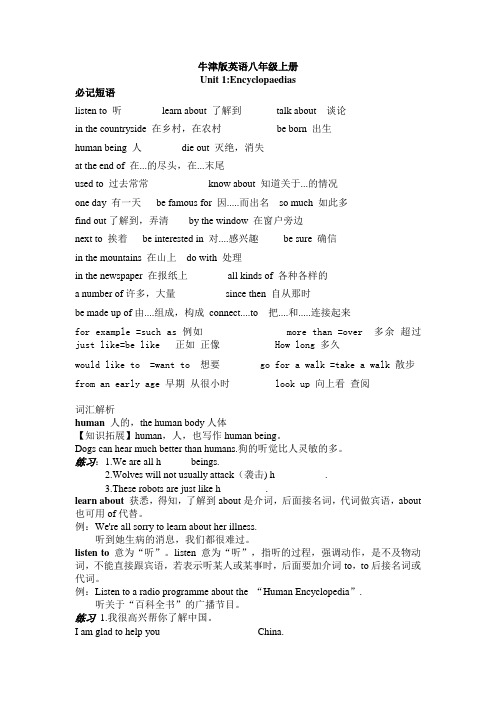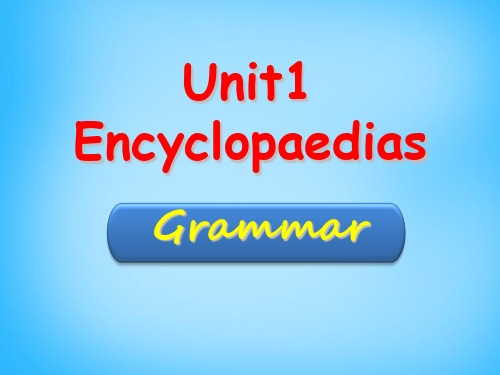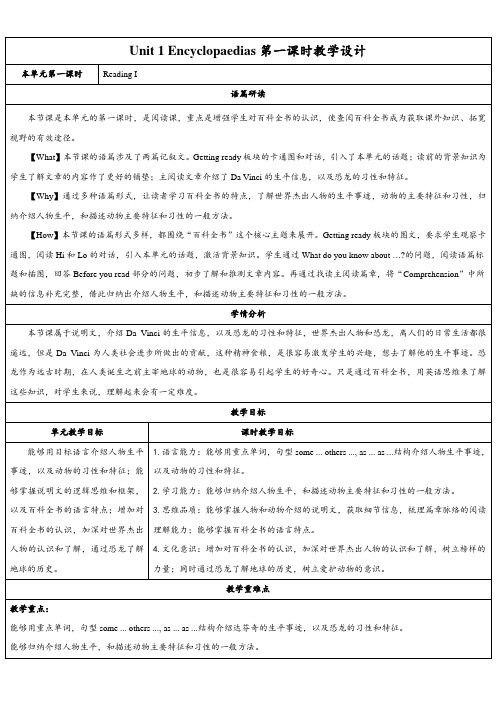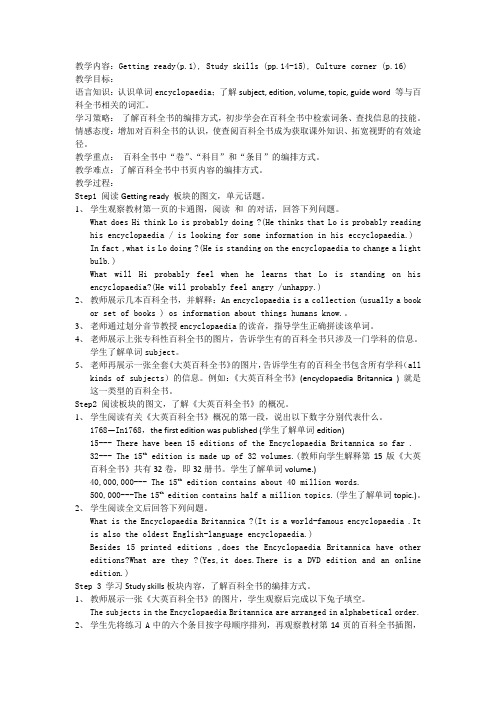牛津广州版八年级上册Unit1 Encyclopedia 第一课时Introduction,study skill,culture corner
牛津英语八上Unit1encyclopaedia

Read the title and the introduction on page 3. Then answer the questions.
What do you know about …?
You are going to read a short article about Leonardo da Vinci from an encyclopaedia. Before you start, try the quiz below. Circle the correct answers. There can be more than one answer.
musician
da Vinci
childhood
engineer scientist
adulthood
many contributions
inventions famous
learnt to do many
showed great intelligence and artistic ability
Oxford English
Unit
1
Module 1 Amazing things
Encyclopaedias
Period 2
Reading (I) Speak up
Background knowledge
Complete the table below.
Subject More
information on
What do you know about …?
You are going to read a short article about dinosaurs from an encyclopaedia. Before you start, try the quiz below. Circle the correct answers.
牛津版英语八年级上册Unit-1知识点讲解+练习题(含答案)

牛津版英语八年级上册Unit 1:Encyclopaedias必记短语listen to 听learn about 了解到talk about 谈论in the countryside 在乡村,在农村be born 出生human being 人die out 灭绝,消失at the end of 在...的尽头,在...末尾used to 过去常常know about 知道关于...的情况one day 有一天be famous for 因.....而出名so much 如此多find out了解到,弄清by the window 在窗户旁边next to 挨着be interested in 对....感兴趣be sure 确信in the mountains 在山上do with 处理in the newspaper 在报纸上all kinds of 各种各样的a number of许多,大量since then 自从那时be made up of由....组成,构成connect....to 把....和.....连接起来for example =such as 例如 more than =over 多余超过just like=be like 正如正像 How long 多久would like to =want to 想要 go for a walk =take a walk 散步from an early age 早期从很小时 look up 向上看查阅词汇解析human 人的,the human body人体【知识拓展】human,人,也写作human being。
Dogs can hear much better than humans.狗的听觉比人灵敏的多。
练习:1.We are all h______beings.2.Wolves will not usually attack(袭击) h__________.3.These robots are just like h_________.learn about 获悉,得知,了解到about是介词,后面接名词,代词做宾语,about 也可用of代替。
上海牛津版初二上册英语第一单元Unit1Encyclopedias知识点习题教案总结(广州地区)

上海牛津版初二上册英语第一单元Unit1Encyclopedias知识点习题教案总结(广州地区)Unit 1 Encyclopedias 单词短语重点句型1.Some dinosaurs were as small as chickens. 有的恐龙和鸡一样小。
2.Dinosaurs lived on Earth more than 60 million years before humanbeings.恐龙早于人类生活在地球上六千多万年。
3.Suddenly dinosaurs all died out. 突然恐龙都灭绝了。
4.However, we can learn about dinosaurs from their fossils.然而,我们可以从恐龙的化石了解它们。
5.Nobody knows why. 没有人知道其中的原因。
6.Would you like some tea? 你想要一些茶吗?课文翻译Look it up! 查一查Here are two articles from an encyclopedia. 这是一本百科全书中的两篇文章。
Da Vinci, Leonardo达芬奇,列奥纳多Leonardo da Vinci(1452-1519) was an Italian painter, inventor, musician, engineer and scientist. Da Vinci was born in the countryside. From an early age, he showed great intelligence and artistic ability. As he grew older, he learnt to do many differentthings. His paintings are very famous, and one, the Mona Lisa, is perhaps the most famous painting in the world. He also had many inventions. For example, his note books include some interesting drawings of flying machines. (SeeArt)达芬奇(1452-1519)是意大利画家、发明家、音乐家、工程师和科学家。
牛津版八年级英语上册Unit1Encyclopaediasgrammar课件

B. somebody and anybody,nobody,etc.
We usually use (some-/ any-) in positive statements.We usually use (some-/ any-) in negative statements and questions .
I saw somebody/someone. I did not see anybody/anyone. Did you see anybody/anyone? I saw nobody/no one.
We can form negative statements in two ways
There is not anybody in the room. There is nobody in the room.
S1: Is there anything under the teacher's desk? S2: No, there's nothing/there isn't anything
under the the teacher's desk.
6.Is there anyone behind the teacher?
We also use some in questions when we expect the answer to be "yes"..
May I have some noodles
?
Would you like some tea
?
Shopping list apples bread milk coffee eggs potatoes noddles orange juice
Encyclopaedias+第一课时+Reading+I+教学设计 牛津深圳版八年级英语上册++

Unit 1 Encyclopaedias第一课时教学设计本单元第一课时Reading I语篇研读本节课是本单元的第一课时,是阅读课,重点是增强学生对百科全书的认识,使查阅百科全书成为获取课外知识、拓宽视野的有效途径。
【What】本节课的语篇涉及了两篇记叙文。
Getting ready板块的卡通图和对话,引入了本单元的话题;读前的背景知识为学生了解文章的内容作了更好的铺垫;主阅读文章介绍了Da Vinci的生平信息,以及恐龙的习性和特征。
【Why】通过多种语篇形式,让读者学习百科全书的特点,了解世界杰出人物的生平事迹,动物的主要特征和习性,归纳介绍人物生平,和描述动物主要特征和习性的一般方法。
【How】本节课的语篇形式多样,都围绕“百科全书”这个核心主题来展开。
Getting ready板块的图文,要求学生观察卡通图,阅读Hi和Lo的对话,引入本单元的话题,激活背景知识。
学生通过What do you know about …?的问题,阅读语篇标题和插图,回答Before you read部分的问题,初步了解和推测文章内容。
再通过找读主阅读篇章,将“Comprehension”中所缺的信息补充完整,借此归纳出介绍人物生平,和描述动物主要特征和习性的一般方法。
学情分析本节课属于说明文,介绍Da Vinci的生平信息,以及恐龙的习性和特征,世界杰出人物和恐龙,离人们的日常生活都很遥远,但是Da Vinci为人类社会进步所做出的贡献,这种精神食粮,是很容易激发学生的兴趣,想去了解他的生平事迹。
恐龙作为远古时期,在人类诞生之前主宰地球的动物,也是很容易引起学生的好奇心。
只是通过百科全书,用英语思维来了解这些知识,对学生来说,理解起来会有一定难度。
教学目标单元教学目标课时教学目标能够用目标语言介绍人物生平事迹,以及动物的习性和特征;能够掌握说明文的逻辑思维和框架,以及百科全书的语言特点;增加对百科全书的认识,加深对世界杰出人物的认识和了解,通过恐龙了解地球的历史。
牛津英语八年级上unit 1 第一课时教案

教学内容:Getting ready(p.1), Study skills (pp.14-15), Culture corner (p.16)教学目标:语言知识:认识单词encyclopaedia;了解subject, edition, volume, topic, guide word 等与百科全书相关的词汇。
学习策略:了解百科全书的编排方式,初步学会在百科全书中检索词条、查找信息的技能。
情感态度:增加对百科全书的认识,使查阅百科全书成为获取课外知识、拓宽视野的有效途径。
教学重点:百科全书中“卷”、“科目”和“条目”的编排方式。
教学难点:了解百科全书中书页内容的编排方式。
教学过程:Step1 阅读Getting ready 板块的图文,单元话题。
1、学生观察教材第一页的卡通图,阅读和的对话,回答下列问题。
What does Hi think Lo is probably doing ?(He thinks that Lo is probably reading his encyclopaedia / is looking for some information in his eccyclopaedia.) In fact ,what is Lo doing ?(He is standing on the encyclopaedia to change a light bulb.)What will Hi probably feel when he learns that Lo is standing on his encyclopaedia?(He will probably feel angry /unhappy.)2、教师展示几本百科全书,并解释:An encyclopaedia is a collection (usually a bookor set of books ) os information about things humans know.。
广州新教材8A 初二 unit1 encyclopedias.
find out
•would like next to
•go for a walk
课文详解
• 1. Is my encyclopaedia useful, Lo?
• useful adj. “有用的,有益的,有帮助的”。
•
•
• 书。
useful是由名词use加后缀-ful构成的形容词,常在句中充当表语或定语。 This dictionary is very useful to us. 这本词典对我们很有用。 This is a useful book for English beginners. 这是一本对英语初学者有帮助的
•
•
drawing 可数名词,图画;素描图
•
辨析:drawing, picture 与painting
• drawing指素描、工程图、线条图、铅笔画、钢笔画等
• picture指图片、图画、照片等。指照片时,与photo意义相同
• painting指着色的水彩画、油画等
7. Dinosaurs lived on Earth more than 60 million years before human beings.
A. millions of B. million of C. two millions of
8. They lived everywher. 到处(=here and there)
•
•
I looked for my dog everywhere, but I couldn’t find it.
•
拓展:(1) useful前使用不定冠词a, 因为它的发音是以辅音音素开头。
(2)以-ful结尾的形容词的反义词多是相应的以-less结尾的形容词。useful (有
广州牛津八年级英语教案Unit 1 encyclopaedia
Unit 1 Encyclopaedias一、教材分析本单元围绕着“百科全书”的话题来展开听、说、读、写的训练。
教材介绍两篇来自百科全书的短文为载体,帮助学生了解百科全书的特点和用法。
作为初二年级的学生,了解和使用百科全书对于提高学生的自学能力有一定的帮助。
语法方面A部分数量词some和any为训练目标,。
B部分重点讲授不定代词somebody, anybody, nobody的用法,并培养学生在完成一篇有关baby dinosaur的短篇故事尝试正确使用这些词。
具体课型、课时安排如下:二、教学对象分析1.学生通过初一的学习,对工具书的使用有一定的了解,通过对百科全书的介绍和用法,提高学习的自学能力,有利于开展本单元的听、说、读、写任务。
2.学生在初一就已经接触过了some 和any 以及不定代词somebody, anybody, nobody的用法,本单元再通过系统地复习,在学习方式上引导学生学习归纳总结。
三、单元教学目标1.认知目标:2. 思想情感目标:1)通过谈论“交友”的相关话题,帮助学生快速适应新环境以及找到新朋友。
2)结合课文的内容,引导学生通过邮件的形式结交更多的笔友,拓展自己的视野。
3. 能力发展目标:1)能够在听、说、读、写等语言综合实践活动中运用本单元的重点词汇、句型与语法。
2)在学习中提高交流和传递信息的能力,在写作中正确运用连词使文章更连贯和流畅。
3)通过指导学生在模拟交际中运用所学的知识,培养学生探究学习、合作学习、自主学习的能力。
四、单元教学重点1. 学生熟练掌握重点词语,词组及句型。
2.指导学生利用所学句型正确表达思想、进行交际活动。
3.指导学生归纳、总结数量词some and any及不定代词somebody, anybody, nobody的用法,并在实践运用中熟练运用。
五、单元教学难点1. 百科全书的用法。
2. 数量词some and any的归纳整理及运用。
牛津版英语八年级上册Unit 1 encyclopaedias 讲义Part1牛
Unit 1 encyclopaedias 讲义Part1课前小测一.下列各组词中,有一个单词划线部分的读音与其他三个不同,请选出。
1. A. man B. age C. band D. fat2. A. but B. must C. under D. pollute3. A. used B. attended C. visited D. ended4. A. may B. enjoy C. rain D. they5. A. clever B. cook C. centre D. cat2.单项选择1.If you keep practicing, I believe you will do well in speaking English.A.be interested inB. come up withC. be good atD.would like2. You spent too much time on computers.It's harmful to your eyes.——I see.Thanks.A. good forB.bad forC. helpful toD. thankful for3. It is raining. I am afraid that we can’t get to the airport on time.A.arrive atB. along withC. take part inD. across from4. Sorry,I broke your cup and I want to apologize to you.A.say"yes" B say"no"C. say "sorry"D. say“thanks"22. Boys usually spend more time ________ computer games than girls.A. playB. playedC. playingD. to play23. This is your school bag. Where is ________?A. meB. myC. mineD. myself24. —What do you usually have for your breakfast?—________ .A. A glass of milk and some breadB. A glass of milk and two breadsC. Some milks and some breadsD. Some milks and a piece of bread三、完形填空Mary is an American schoolgirl. She is now in Beijing with her parents. She doesn’t know ____31____ but she is trying to study and speak it. She often tries to speak Chinese to her Chinese ____32____. Sometimes they don’t ____33____ her, because she can’t speak Chinese ____34____.It’s Saturday morning. Mary goes out. She is on her ____35____ to the park. She is going there to ____36____ a flower show. But she doesn’t know ____37____ to get there. She asks a Chinese boy. The boy can’t understand her. Then she ____38____ a pen and some paper. She draws ____39____ on it, gives the picture to the boy and says something about it. The boy ____40____ and then shows Mary the way to the park.31. A. English B. maths C. Russian D. Chinese32. A. workers B. visitors C. friends D. parents33. A. hate B. understand C. remember D. like34. A. well B. good C. quickly D. slowly35. A. home B. way C. side D. bike36. A. sell B. make C. see D. buy37. A. where B. when C. why D. how38. A. puts out B. takes out C. looks out D. takes off39. A. flowers B. pens C. fruits D. ships40. A. stops B. shouts C. smiles D. criesUnit1 EncyclopaediasPre-study1.Encyclopaedia n.百科全书a reference work (often in several volumes) containing articles on various topics (oftenarranged in alphabetical order) dealing with the entire range of human knowledge or with some particular specialty.Eg: He was a walking encyclopaedia.PartIImportant words1.Inventor n.发明家Invent v. 发明Invention. 发明,发明物Eg: Edison is a great inventor.He invented a new tool that could help him solve the problem.注:invent 发明指创造出之前不存在的事物,discover,发现,指找到了已经存在的事物,eg: Colombo discovered the new land in 1492.2.Musician n. 音乐家Music 音乐Eg: He is a musician, and he plays music very well.3.Scientist n. 科学家Science n. 科学Scientific adj. 科学的Eg: Tom is a scientist. He studied science when he was 10 years old. There are many scientific books in his home.4.Born v (be born)出生原型为bear, born为其过去分词,用于“出生”时,必须用be born 的形式。
牛津深圳版八年级英语上册Unit1Encyclopaedias第一课时ReadingI优秀教学案例
1.教师设计一系列问题,引导学生深入思考文章的内容和主题,提高学生的阅读理解能力。
2.教师鼓励学生提出问题,培养学生的批判性思维和问题解决能力。
3.教师通过问题引导学生思考百科全书的发展历程和未来趋势,激发学生的学术兴趣。
(三)小组合作
1.教师将学生分成小组,鼓励学生进行讨论和交流,提高学生的合作能力和团队意识。
2.学生通过小组讨论,分享自己的观点和看法,培养合作学习和交际能力。
3.教师巡回指导,给予学生必要的帮助和反馈,确保讨论的深入和有意义。
(四)总结归纳
1.教师邀请学生代表分享小组讨论的成果,并进行总结归纳。
2.教师强调百科全书的作用和价值,提醒学生善于利用百科全书获取知识。
3.教师总结本节课的重点内容,确保学生对所学知识有一个清晰的认识。
牛津深圳版八年级英语上册Unit1Encyclopaedias第一课时ReadingI优秀教学案例
一、案例背景
本案例背景以牛津深圳版八年级英语上册Unit1 Enyclopaedias第一课时Reading I为基础,旨在通过阅读一篇关于百科全书的篇章,让学生掌握相关词汇和表达方式,提高阅读理解能力和语言运用能力。同时,通过本节课的学习,让学生了解百科全书的作用和价值,培养他们的信息素养和学术兴趣。
2.教师讲解文章中的重点词汇和短语,如encyclopaedia、information、invent等,并演示如何运用到实际情境中。
3.教师分析文章的结构和逻辑关系,帮助学生理解文章的组织方式。
4.教师针对文章中的长难句进行讲解,提升学生的语法和句子结构理解能力。
(三)学生小组讨论
1.教师将学生分成小组,并提出讨论问题:“How do you think encyclopaedias have changed over time?”, “What do you think the future of encyclopaedias will be like?”。
- 1、下载文档前请自行甄别文档内容的完整性,平台不提供额外的编辑、内容补充、找答案等附加服务。
- 2、"仅部分预览"的文档,不可在线预览部分如存在完整性等问题,可反馈申请退款(可完整预览的文档不适用该条件!)。
- 3、如文档侵犯您的权益,请联系客服反馈,我们会尽快为您处理(人工客服工作时间:9:00-18:30)。
5 Pianos 6 Light 7 Qin Shihuang 8 Trees
_____ _____ _____ _____
Look at the picture of an encyclopaedia on page 14 and choose the best answers.
C Below are some instructions. Which word in each instruction
Unit 1
e n c y c l o p a e d i a
Do you know of any types of encyclopaedias?
1768
15 32 40,000,000 500,000
the first edition
volume
topic
Iቤተ መጻሕፍቲ ባይዱ is a world-famous encyclopaedia. It is also the oldest English-language encyclopaedia.
3 Talk about festivals in China.
4 Write a passage on the history of computers.
____________
预习P2-P3 听音频,跟读课文第一段“Leonardo Da Vinci” 熟读成诵 跟读单词并熟读,从“encyclopaedia”到 “however”(共17个单词)
Yes, it does. There is a DVD edition and an online edition.
S tudy skills
A In which volumes can you find information about the
following topics? Write the correct volume numbers in the blanks.
B In which of the encyclopaedias below can you find
information on the following topics? Write the correct letters in the blanks.
1 Elephants _____ 2 Sound _____ 3 The Stone Age _____ 4 Opera _____
Q:Where can we find the information about Leonardo Da Vinci ?
A. Novel
B. Encyclopaedia
C. Comics
Encyclopeadia
I t i s t r u ly a c o m p e n d i u m o f k n o w l e d g e .
tells you which topic to look up in an encyclopaedia?
1 Find information on dogs. ____________ ____________ ____________
2 Find information on the invention of numbers.
